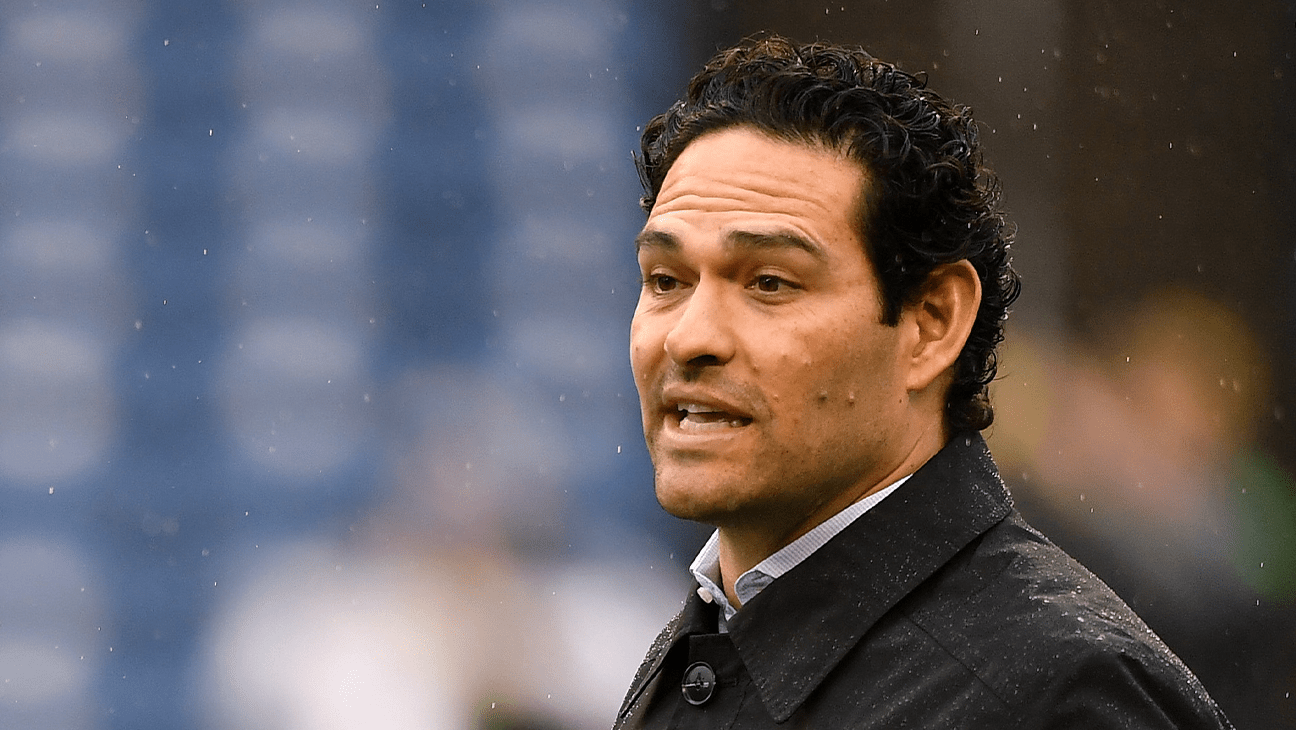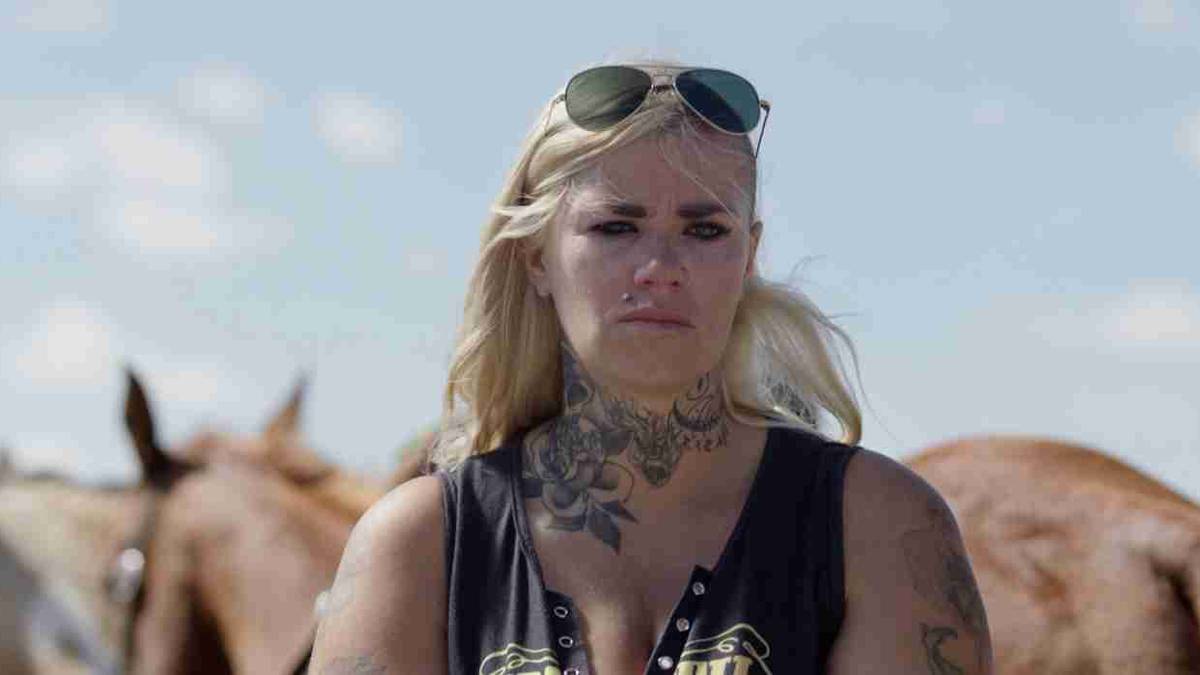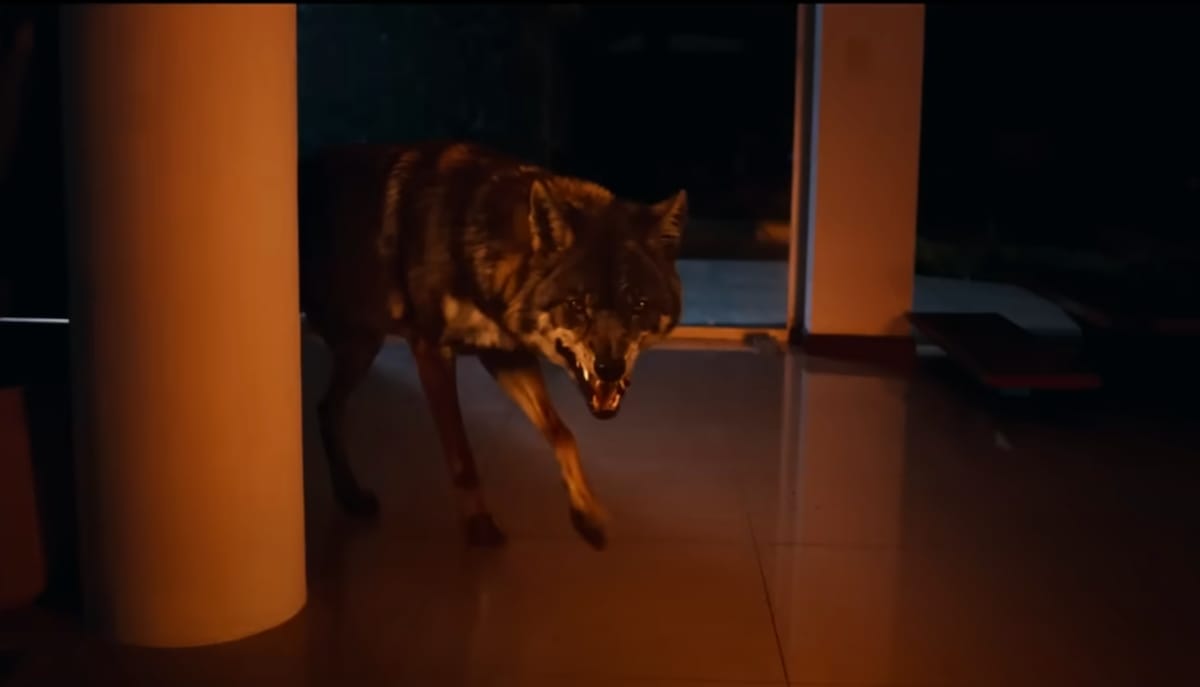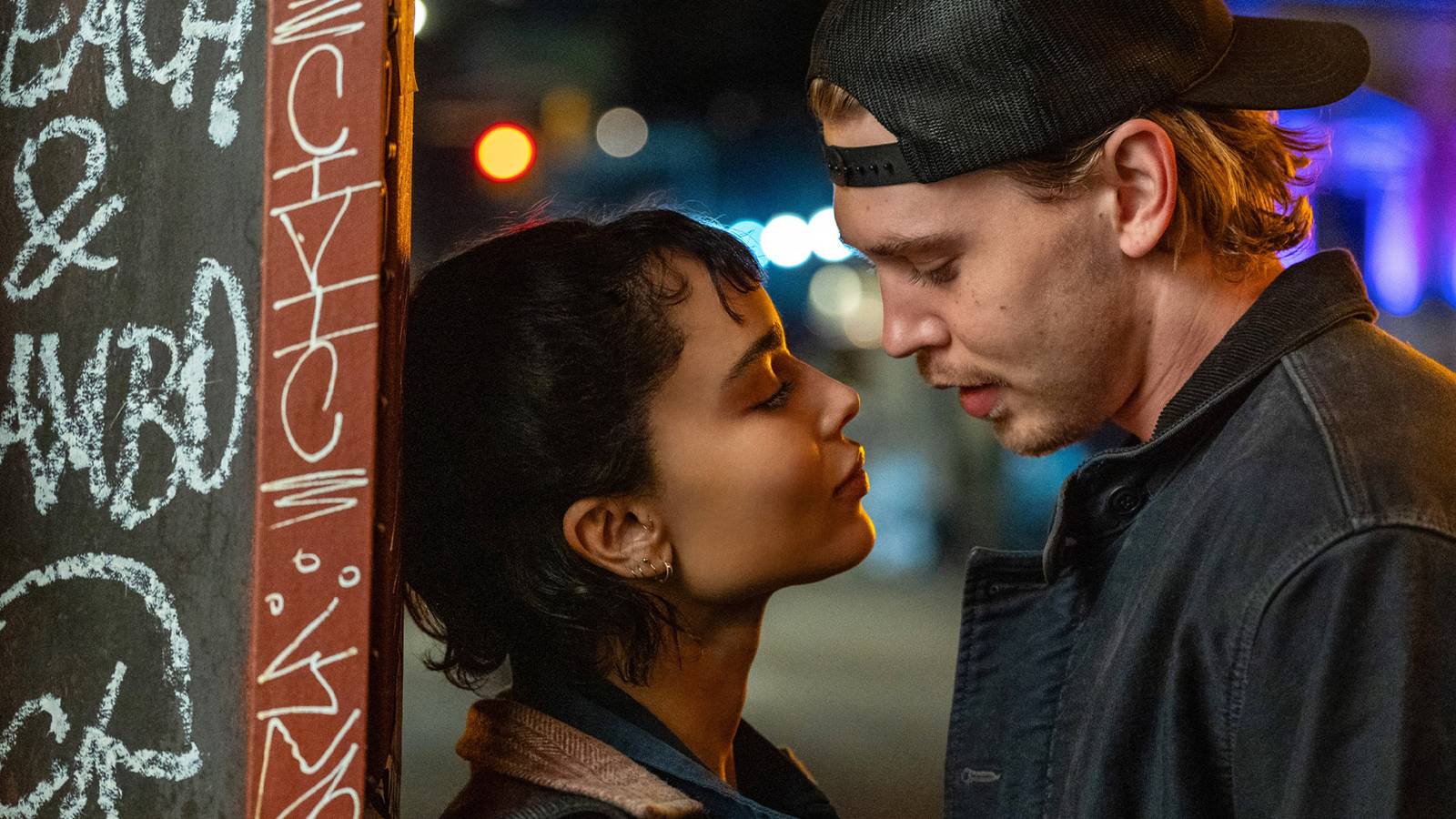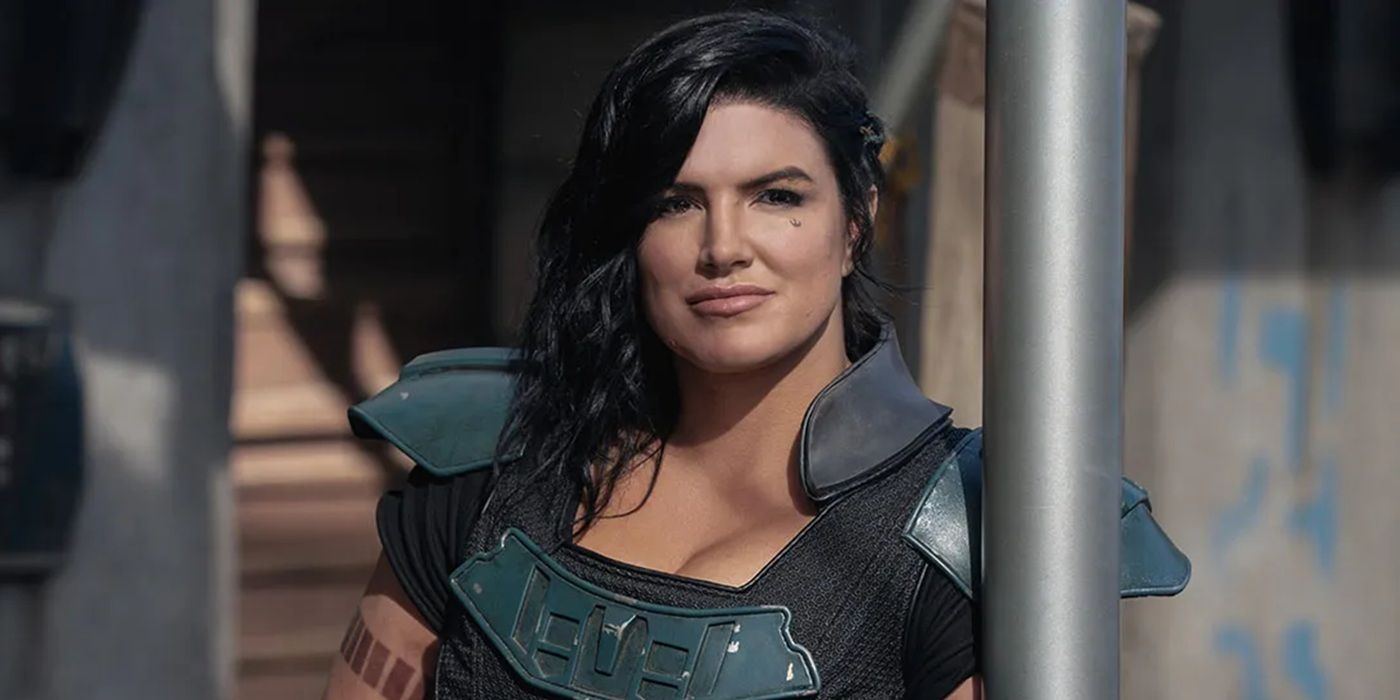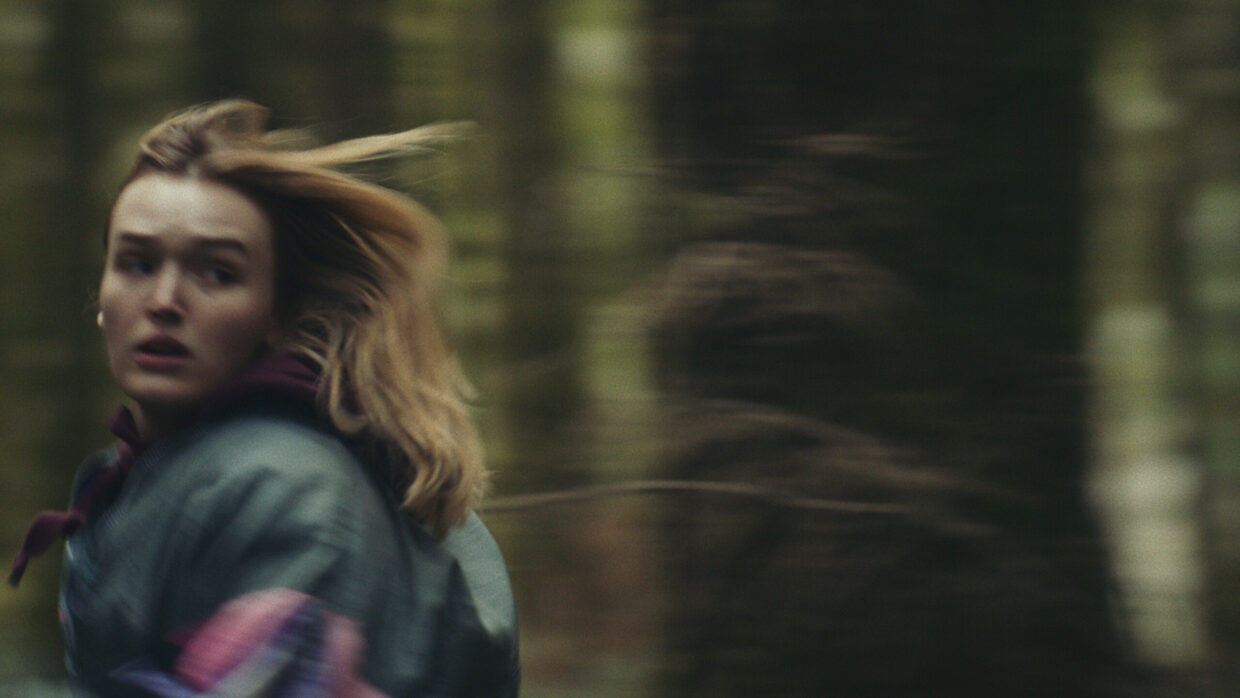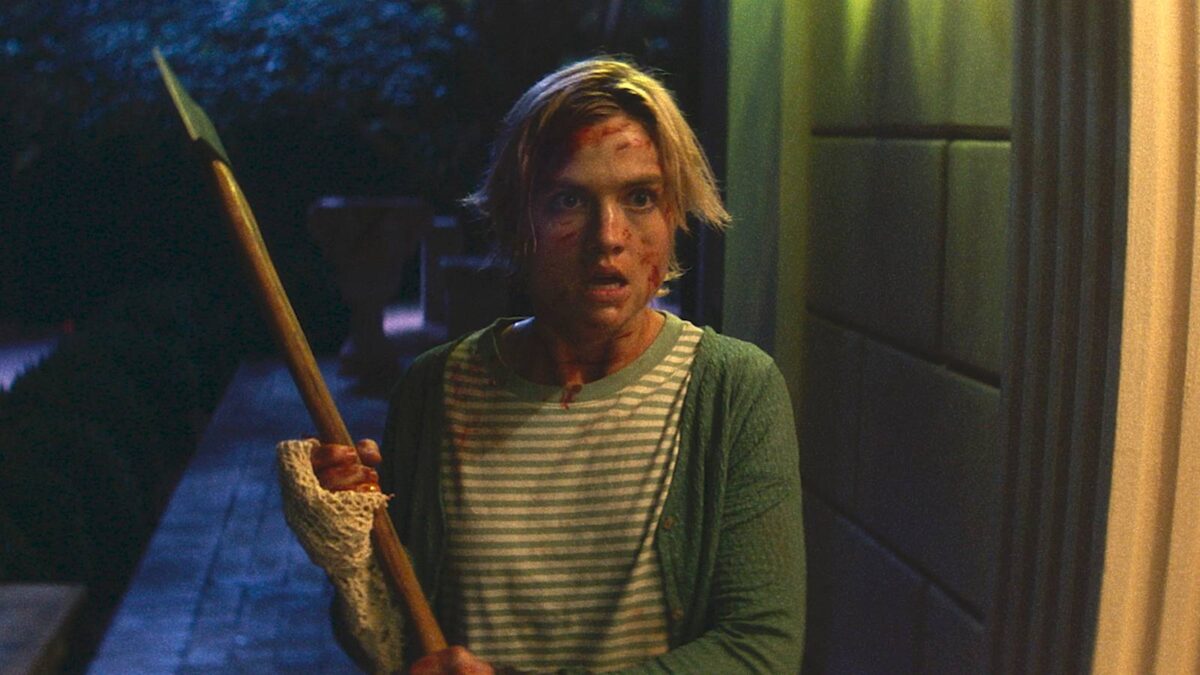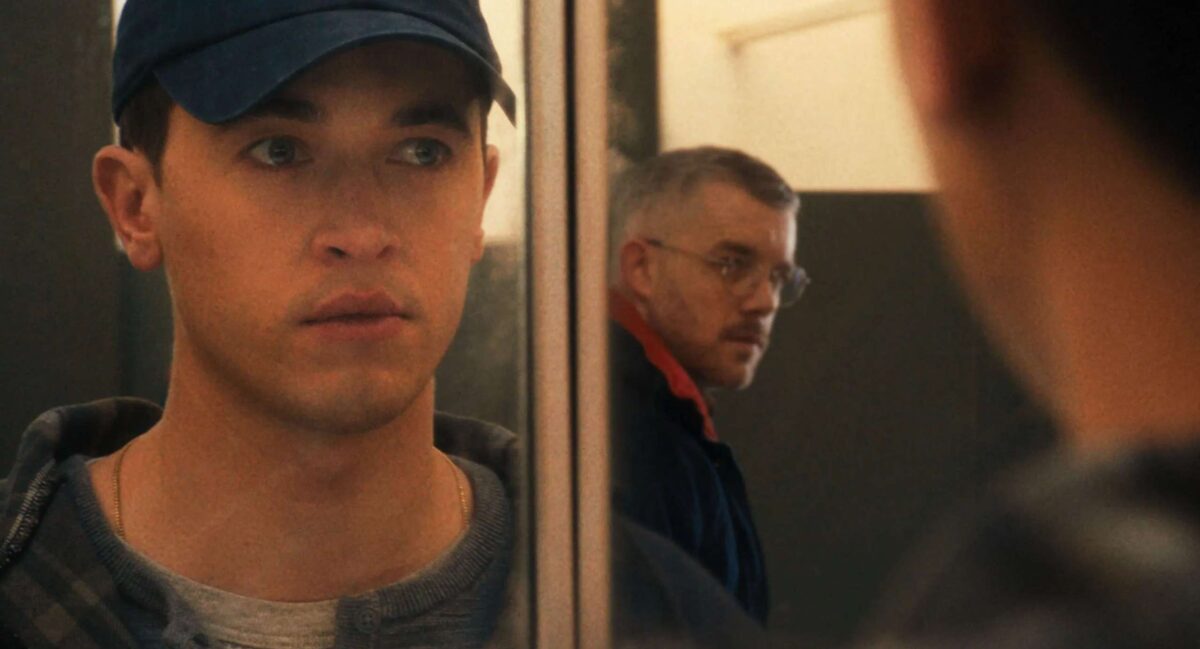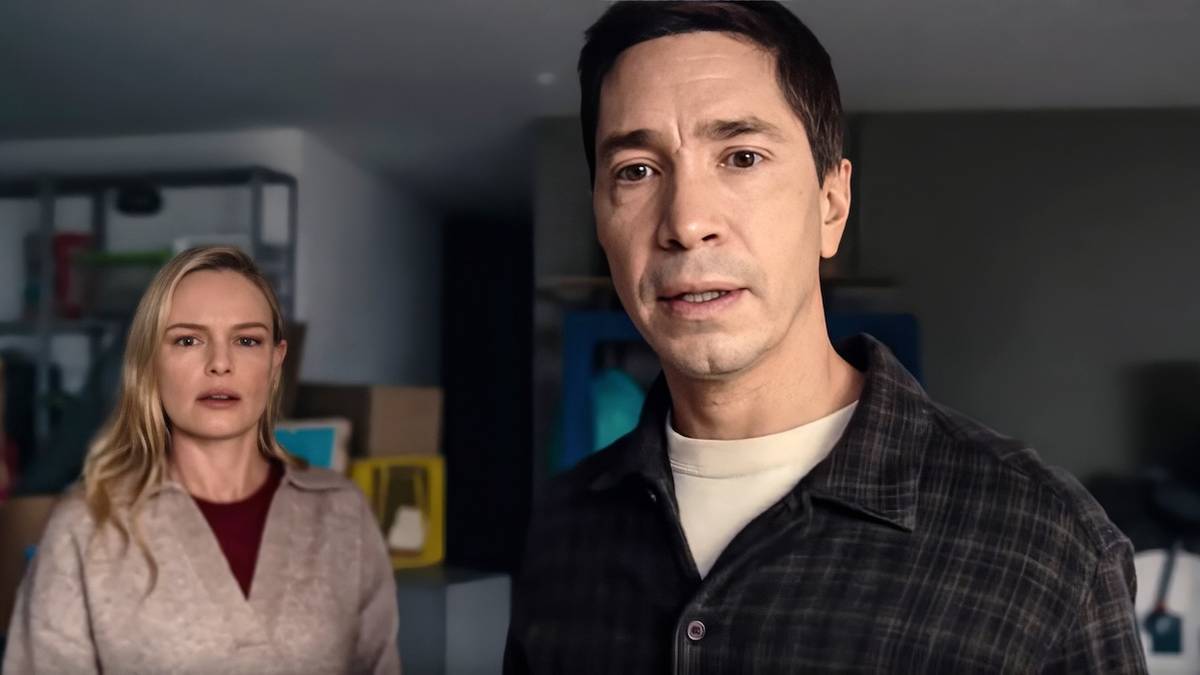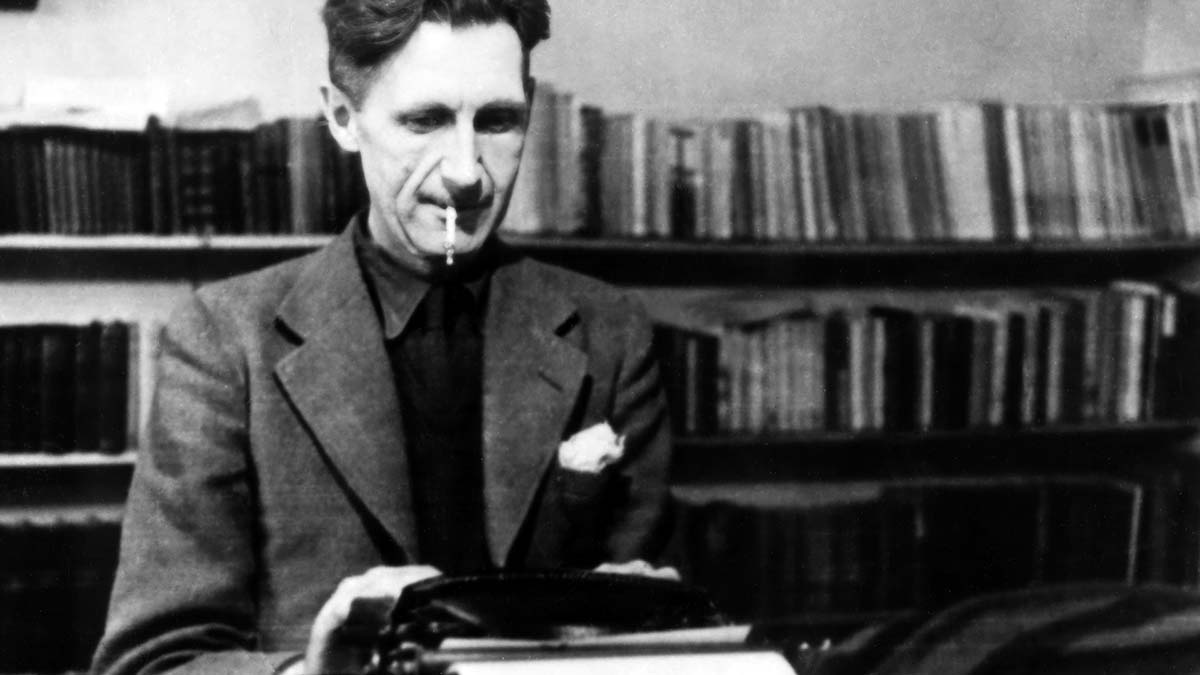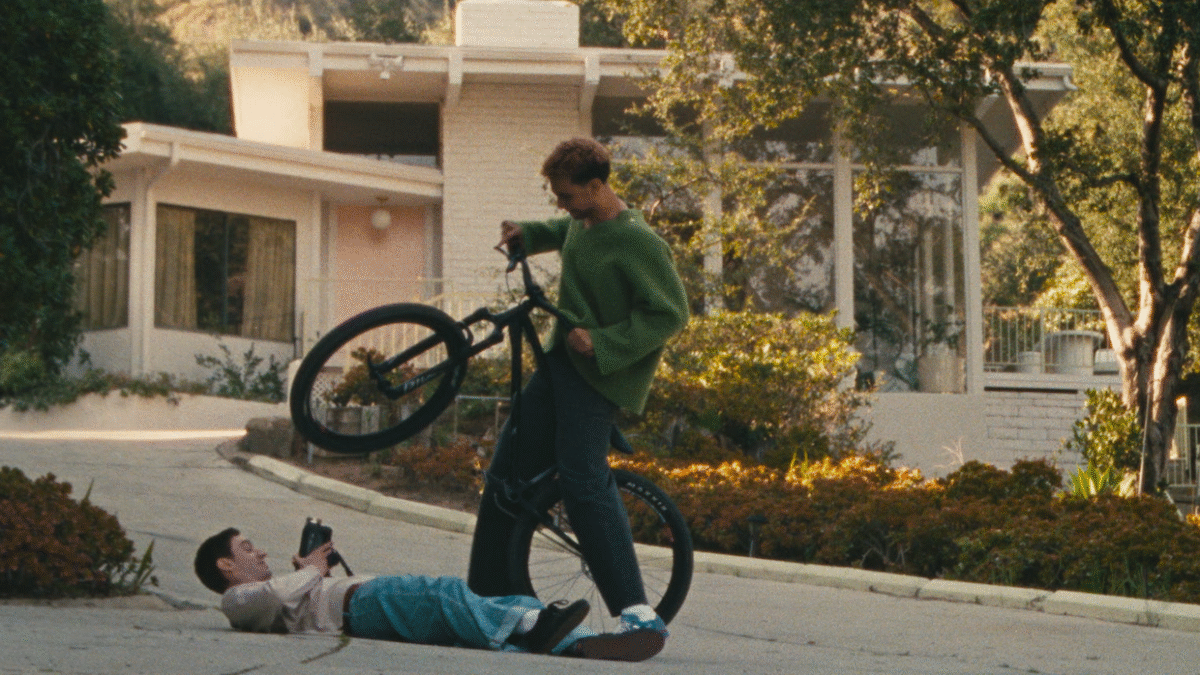
Interview: Alex Russell on Lurker
Aug 22, 2025
The first time we see retail worker Matthew (Théodore Pellerin), it’s through the eyes of his new friend Oliver (Archie Madekwe), as the up-and-coming popstar films him with a camcorder. It’s an arresting opening image, given how much the rest of Lurker finds Matthew gazing at Oliver in adoration instead. “I need a real person,” the fickle musician says, soon after their chance encounter. He’s talking about seeking the honest opinion of a regular person on his music, not the blind adoration of a fan. Little does he know just how meticulously crafted Matthew’s personality really is. Having secured a job shooting a documentary for Oliver and ingratiated himself into his inner circle, Matthew’s determination to sustain his place there takes on increasingly desperate and dark dimensions.
A tale of shifting power dynamics and put-on personas, Lurker charts Matthew’s status from irksome parasite to sinister puppeteer. At first, he comes across as someone so desperate to do and say the right thing, the awkward desperation wafts off him all the more. The camera focuses on him, capturing flickers of emotion as Oliver and his team have conversations just nearby in a circle he’ll never truly be part of. By the end, however, he has thrillingly, terrifyingly, arrived.
I spoke to Russell about Lurker’s smart use of social media, shooting its handheld camcorder portions and the underlying homoeroticism inextricable from this kind of film. The film opens August 22 from MUBI.
Filmmaker: You’ve described Lurker as Mean Boys. While watching it, I was also thinking of films like All About Eve, The Talented Mr. Ripley and Ingrid Goes West. What were your cinematic influences?
Alex Russell: Ripley was definitely one. A big one was Whiplash (2014). That movie is really about two people, with one desperate to impress the other. The toxic evolution of that dynamic leads to more and more extreme consequences. When I was writing, I wanted the first half of Lurker to feel like Almost Famous (2000) and then the second half to feel like Nightcrawler (2014), but it ended up being much more tonally consistent rather than having a big shift in the middle. Almost Famous is really good at making you feel like you’re stepping into a fantasy world, this insider view of the music world. That movie felt like it understood the environment it was talking about. I didn’t see those other movies [All About Eve and Ingrid Goes West] until after writing this movie. It’s cool to see how people have spun this into a genre and the ways in which they make it their own. In my case, I really wanted it to be funny, and this marriage of high tension and comedy in a way I hadn’t really seen with this type of movie. Often, these stories of obsession have something in them that I think is very funny—when a character takes things way too seriously. It’s also something I find funny in people, when there’s something that should be silly and they take it extremely personally.
Filmmaker: You’re a writer and supervising producer on Beef and The Bear, which are also stories about obsession, whether a fixation on revenge or getting a very specific kind of restaurant service right. They too have characters that self-sabotage and spiral. What experiences of working on those shows did you draw on for Lurker?
Russell: I actually wrote this movie before I worked on either of those shows. So, in a way, it’s the reverse—having written Lurker helped me get these jobs in the first place. Maybe the creators of those shows saw something kindred in the kind of obsessive, spiralling narcissist I had written. I personally love urgent stories of people who are desperate and unhealthily bent on something. They really take you along for the ride even if I can’t relate to going that hard about anything. It just feels good to watch when a character has a singular, converging mission, because then you can tell a story about what that means and can layer in things. When you understand what a character is going for, what they’ve sacrificed and what they’ve become in doing those things, it gives the story rails. Ambition is a pervasive theme of everything I’ve worked on.
You don’t always get to choose what shows you work on, but I ended up on things that embraced my sensibilities and what I find interesting. If I do another movie, there’s probably going to be a character who’s obsessive about something. So many of the best stories take different forms of this. Every romcom is about someone preoccupied with getting someone back. Even a traditional story like Rocky (1976) is very clear about what the stakes are. He has to win that fight and then you’re rooting for him to do so. But what happens when the thing that your characters are pursuing starts to unravel, or is maybe not even a worthwhile endeavour?
Filmmaker: There are directors who’ve spoken about not wanting to photograph cellphones and social media because they don’t see their cinematic potential. Even though you use closeups of texts and emails sparingly in Lurker, they’re such a great tool of tension and deception. There’s a smiley that’s terrifying.
Russell: I really appreciate you saying that. I fundamentally disagree with the notion that it’s not additive or cinematic, or that it can’t be. It just has to be specific and it has to mean something. Earlier, when you’d see texts onscreen, it would just be exposition. Stuff like:
“Hey, what are you doing tonight?”
“Nothing.”
“Want to hang out?”
This is not additive. Now take your example of the smiley face—it’s so specific. Matthew types, “I just want to finish my documentary.” Then there’s an exclamation point, then he deletes that, then adds the smiley. Everyone gets what’s funny and tense about it. These are very sparingly chosen moments. To just ignore any screen stuff would’ve been a mistake. A lot of people probably think there’s a ton of screen stuff in this movie, given how much they’ve talked about its relationship to social media, but it really is about the human-to-human stuff. Anytime a screen does pop in, it’s giving you information you couldn’t get with just someone’s face or through something said out loud. I like it. When done well, it’s really fun, but it has to be considered and purposeful. It’s similar to how voiceovers can be very cool or unnecessary. We also shot all of those social media scenes practically. Those are real phones and emails. I can always tell when it’s digital or greenscreen so we did it this way, but it was weird and silly when we had our whole crew shooting smiley face inserts on a phone. That’s when you really start to feel like this is a waste of time.
One of my favourite scenes is when Matthew is on the ride home and he’s texting the friend Oliver just invited to a party and saying, “You don’t have to come back tomorrow.” The music is so loud and you can tell that he’s freaking out but he’s trying to act calm and text. I think people will understand that.
Filmmaker: In stories of men attempting to ingratiate themselves into the circles of someone more popular or wealthy—Ripley or Saltburn (2023)—there’s an element of homoeroticism to their pursuit, as there is in Lurker. Why do you see that as crucial to this kind of movie?
Russell: I want people to have their own interpretations of how gay or not gay Oliver and Matthew are, because the way this comes into play is maybe not what people are expecting. There are two scenes that mirror each other, in which one character offers themself to the other and is either rejected or diverted away from that. The point is that there is this homoerotic tension, but it’s not all about that. That’s not why the story is happening. It’s not about either being attracted to the other, it’s that both of them are willing to use their sexuality to get what they want. When they offer themselves to each other, it’s in the hope that that’s what the other person wants, and in doing so, they will get what they themselves want. In the case of Matthew, it’s continued proximity. In the case of Oliver, it’s continued success. Whatever their sexuality is or isn’t, it’s all about power in that moment. They’re willing to adopt whatever sexuality they need to. But I do want people to interpret that themselves. In The Talented Mr. Ripley or Saltburn, it’s maybe a little more clear. There’s also something inherently very homoerotic about intense male friendships. Any tension between straight men can be homoerotic.
Filmmaker: The scene in which Matthew wrestles Oliver on his bedroom floor is a very literal manifestation of him wrestling with his emotions but also such a tense, uncomfortable sequence. How did you approach that at the script stage and on set?
Russell: The “let’s wrestle” scene is one of my favorites in the movie. By this time, the tension between these two characters has gotten to the point where you’re like, “Are they going to have sex? Are they going to die? One of those things has to happen now.” And it’s like, “Actually, there’s a third thing — they’re going to wrestle.” [Laughs] It’s so funny but it also makes sense for Matthew’s inner child to want to do that. It’s not about wanting to be Oliver’s boyfriend; he wants to be doing this power play with him.
When I wrote it, it was just an action line at the end of the scene: “and then they wrestle.” It was small in the script but is substantial in the movie. I went through multiple drafts and sent it to the actors. One time, I accidentally sent over a draft in which the bottom half of the scene had gotten cut out. It was the first time I got notes from Théo and Archie. They both independently hit me up like, “Hey, what happened to that wrestling scene? I really wanted to do that.” Both of them were really excited about it—it’s such a good acting moment. That was the only time I got notes from either of them.
On the day of shooting it, the real question for me was: Who ends up on top by the end of the scene? Because they start out on the bed, then hit the floor, and someone has control over the other by the end, but who [that person would be] wasn’t specified in the script. It could’ve been a situation in which Matthew is on top and has the power and he’s pinning Oliver to the floor, but what I ended up liking was that Oliver was the one on top at the end, holding Matthew down, but Matthew was laughing and Oliver was stressed. So it’s like Matthew has manipulated Oliver into pinning him down, rather than pinning him down himself. I thought that was a cool way to end the scene. Look at Oliver’s face! You can just tell he’s imploding.
Filmmaker: Tell me about shooting the camcorder portions. There’s such an easy intimacy to them, as opposed to the carefully calibrated dynamics of the rest of the film. At the same time, it establishes Matthew as someone who’s watching the fun, not part of it.
Russell: Most of the time, my cinematographer [Pat Scola] would hold the camcorder and I’d encourage him to be invasive with it. So, some of the shots in the movie are him zooming in really aggressively on someone’s face in a way that feels uncomfortable—if those characters knew how zoomed-in they were, they wouldn’t like it. The rest of the time, I’d hand it over to Théo while it was recording and have him use it as a prop. We did a lot of experimentation with the camcorder, knowing that it was okay if it got a little sloppy because we wanted it to feel real. The camcorder was such a cheat code because it allowed us to shoot at LAX. We just sent the actors in with it for 30 minutes. We couldn’t have done that with a huge crew. All the London portions transition into camcorder when they go out at night. That’s what’s great about Matthew having his own documentary within the movie—it makes sense that we would be living in his POV at this moment. That’s really helpful when you’re shooting a low-budget movie.
Filmmaker: What were your references when it came to Oliver’s music? How did you envision the genre he’d fit into, the kinds of songs he’d write and what they would say about him as a character?
Russell: It’s sort of this DIY pop music of the late 2010s. My friend Kenny Beats, who produced all the music for the film, knew exactly what type of character this was. He’s produced a lot of music for these kinds of artists. Rex Orange County wrote one of the songs and was a great reference, because he’s a British artist who spends a lot of time in LA and is very involved in the LA music scene. So, I just delegated that to Kenny and asked him to craft the kind of sound that made sense for the character. If it felt off, I would’ve asked him to change it but he recorded two songs with Archie over a couple of days and when I heard them, I was like, “These are perfect.” It was really straightforward.
Filmmaker: Matthew’s putting on a front for so much of the film, but it only ends up showcasing his insecurities all the more. His expressions get incredibly unnerving as his facade falls away. What went into building that performance with Théodore?
Russell: What was very helpful to us was that he was attached to the film for three years before we shot it. So, we really got to talk about everything and he got to spend some time in LA. So much of what he brought to his original audition tape is what you see in the movie. His interpretation of the character was so layered. You really want to feel the ambiguity of his intentions—you want to see what he’s thinking but not where he’s going. There’s this other movie he’s in, Never Rarely Sometimes Always (2020), and that performance was really helpful for me to have seen before casting him because you really wonder, “Is this guy good or bad? Is he sweet or calculating?” These are all things you want to feel with Matthew. There are gears turning. He’s unpredictable.
When we were on set, it was really important to dial back how absurd and crazy he’s acting in the third act. So one of the conversations we had was: Let’s tone this down. Let’s have him act like everything’s normal. That would be the most insidious version of this. Even though he’s crossed the line, he’s acting in the same tenor as before. He’s pretending that nothing crazy has occurred. That was the big conversation that I stand by. And Théo’s just so good. He couldn’t be more the opposite of Matthew; he’s just such a sweet, thoughtful boy.
Publisher: Source link
Erotic Horror Is Long On Innuendo, Short On Climax As It Fails To Deliver On A Promising Premise
Picture this: you splurge on a stunning estate on AirBnB for a romantic weekend with your long-time partner, only for another couple to show up having done the same, on a different app. With the hosts not responding to messages…
Oct 8, 2025
Desire, Duty, and Deception Collide
Carmen Emmi’s Plainclothes is an evocative, bruising romantic thriller that takes place in the shadowy underbelly of 1990s New York, where personal identity collides with institutional control. More than just a story about police work, the film is a taut…
Oct 8, 2025
Real-Life Couple Justin Long and Kate Bosworth Have Tons of Fun in a Creature Feature That Plays It Too Safe
In 2022, Justin Long and Kate Bosworth teamed up for the horror comedy House of Darkness. A year later, the actors got married and are now parents, so it's fun to see them working together again for another outing in…
Oct 6, 2025
Raoul Peck’s Everything Bagel Documentary Puts Too Much In the Author’s Mouth [TIFF]
Everyone has their own George Orwell and tends to think everyone else gets him wrong. As such, making a sprawling quasi-biographical documentary like “Orwell: 2+2=5” is a brave effort bound to exasperate people across the political spectrum. Even so, Raoul…
Oct 6, 2025
